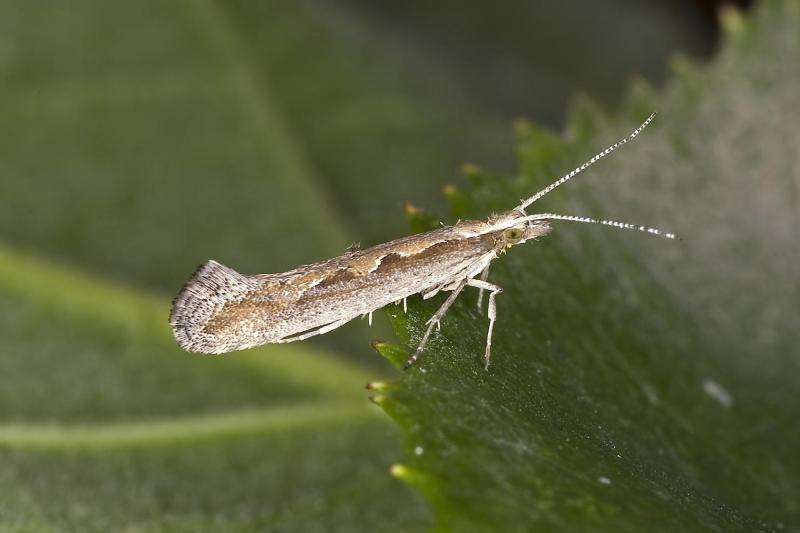Diamondback moth. Credit: Olei/Wikipedia/CC-BY-SA-2.5 and GNU FDL
(Phys.org)—A team of researchers at British company Oxitec has developed a genetic approach to controlling diamondback moth caterpillars and report that trials in greenhouse conditions has gone so well that they are ready to conduct tests in the wild. In their paper published in the journal BMC Biology, the team describes their technique, how it works, how safe they believe it is and their hopes that their efforts will lead to reduced crop destruction by the caterpillars
Diamondback moth caterpillars are one of the world's worst insect pests—they eat holes in the leaves of kale, cabbage, canola, broccoli and cauliflower, killing the plants and causing billions in dollars of losses for farmers around the world each year. Efforts to curb them have been mixed and the caterpillars appear to be winning—they have developed immunity to most chemicals applied to kill them. For that reason scientists have looked to other ways to tackle the problem, one of which is genetic modification. The team at Oxitec, has come up with a way to cause female offspring of the moths that parent the caterpillars to die before they can reproduce, slowly causing a drop in population when they are released into a native group.
In coming up with their self-limiting gene approach the team added another piece of usefulness—an off switch. The gene only self-limits in the absence of tetracycline, such as when the moth is out in the wild. To grow a community of the moths, the team need only feed them food with the chemical added. They note that their technique allows for targeting just diamondback moths, thus other insects would not be harmed—and neither would birds or other animals if they eat the moths or caterpillars.
The team at Oxitec report that greenhouse environment testing has gone very well—so well in fact they are ready to test their technique in the wild—in limited releases, of course. Officials with the Department of Agriculture in the U.S. have given the go ahead for new outdoor trials in New York State.
This would not be the first testing of its kind, similar genetic engineering on mosquitoes has been tested in Panama, the Cayman Islands and Brazil—in such trials insect populations have been reduced by 90 percent.
More information: Pest control and resistance management through release of insects carrying a male-selecting transgene, BMC Biology 2015, 13:49 DOI: 10.1186/s12915-015-0161-1
Journal information: BMC Biology
© 2015 Phys.org






















